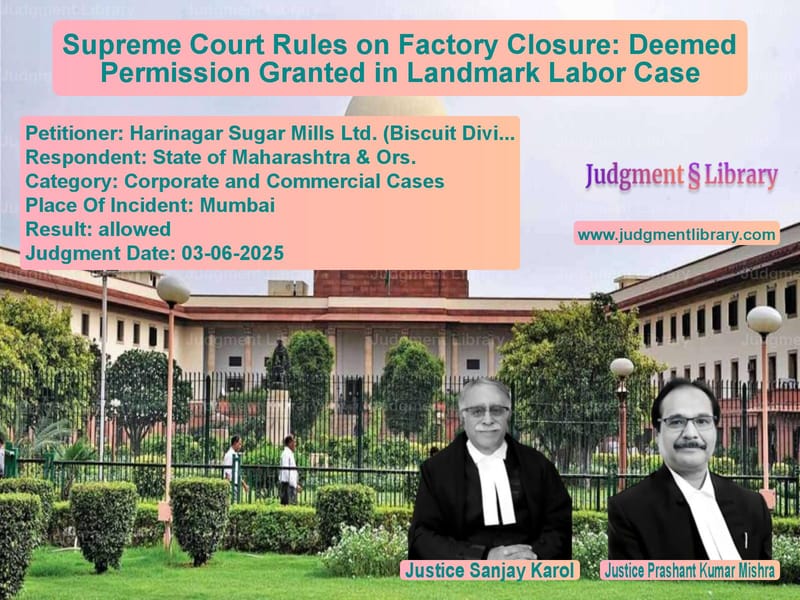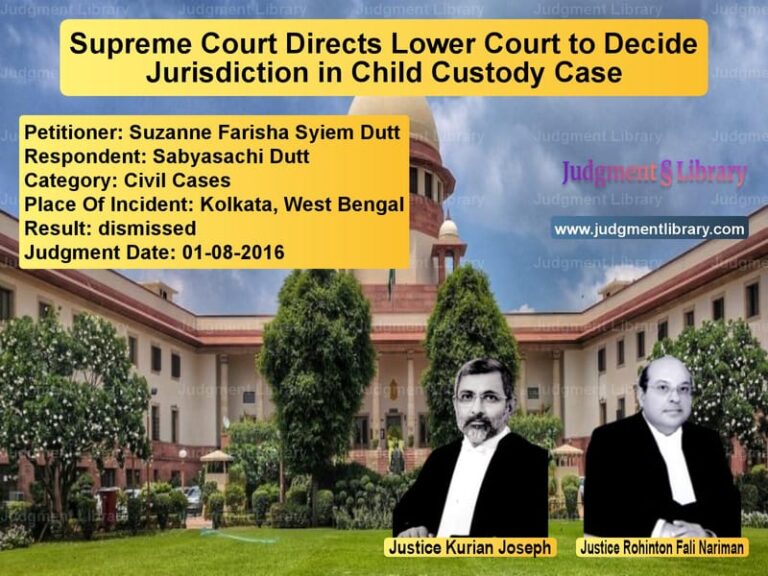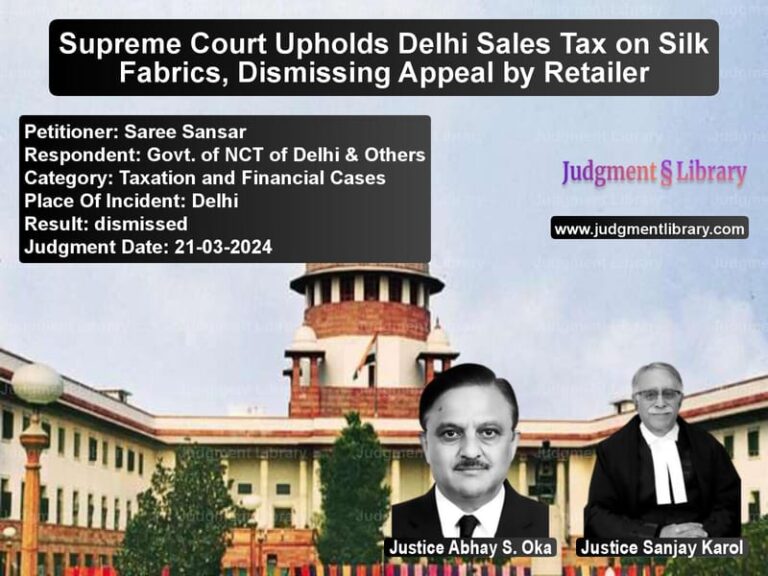Supreme Court Rules on Factory Closure: Deemed Permission Granted in Landmark Labor Case
In a significant judgment that balances the rights of employers and employees, the Supreme Court of India recently delivered a verdict that clarifies the legal position on factory closures under industrial law. The case involved Harinagar Sugar Mills Ltd., which had been manufacturing biscuits exclusively for Britannia Industries Limited for over three decades until their job work agreement was terminated in 2019. What followed was a complex legal battle that reached the nation’s highest court, raising important questions about business closure procedures and workers’ rights.
The Background of the Case
Harinagar Sugar Mills Limited (Biscuit Division) had been engaged in biscuit manufacturing exclusively for Britannia Industries Limited for more than three decades under Job Work Agreements that were extended from time to time. This long-standing business relationship came to an abrupt end when Britannia Industries terminated the agreement with effect from November 20, 2019, citing the 180-day notice period mandated by their contract. The termination letter stated that the notice period would begin from June 1, 2019, effectively ending their business relationship on November 27, 2019.
Faced with the loss of their only client, Harinagar Sugar Mills found itself in an impossible situation. The company had been manufacturing biscuits exclusively for Britannia Industries throughout its 32-year operation, with Britannia providing the raw materials and necessary plant and machinery. With no other manufacturing avenues available, the company had no alternative but to apply for closure of its biscuit division. On August 28, 2019, the company filed an application for permission to close down the undertaking, citing the termination of their exclusive manufacturing agreement as the primary reason.
The application clearly stated: “Thus BIL has terminated the job work agreement with the Biscuit Division and the said Division has no other manufacturing avenue, since the said Division was manufacturing biscuits only for BIL. In view of the above, the Biscuit Division has no other alternative but to close down the manufacturing activities.” The application affected 178 permanent workmen whose services would be terminated due to the closure.
The Legal Battle Begins
The Maharashtra government responded to the closure application through a letter dated September 25, 2019, sent by the Deputy Secretary of the Industries, Energy and Labour Department. The letter stated that the application failed to disclose efforts to prevent closure and did not provide cogent reasons for the proposed shutdown. The authorities asked Harinagar Sugar Mills to resubmit their application with additional details about their efforts to avoid closure and more substantial rationale for their decision.
The company responded on October 10, 2019, providing further particulars as requested. They detailed how they had immediately tried to persuade Britannia Industries to continue the agreement without success. They had also approached other biscuit manufacturers including Mondelez India Limited and ITC Ltd., but received no positive responses. Despite this additional information, the authorities again found the response lacking and asked for further details through a letter dated November 4, 2019.
At this point, Harinagar Sugar Mills took the position that by virtue of Section 25-O(3) of the Industrial Disputes Act, 1947, the permission for closure should be deemed to have been granted since the statutory 60-day period for government response had expired. The company argued that the authorities had become functus officio (no longer having legal authority) to demand further information.
The High Court’s Decision
The matter reached the Bombay High Court, which delivered its judgment on February 17, 2023. The High Court dismissed the writ petitions filed by Harinagar Sugar Mills, holding that the company’s closure applications were incomplete and therefore the deeming provision of Section 25-O(3) would not come into play. The court observed that since the company had sought to furnish additional reasons through their October 10, 2019 letter, this amounted to an acceptance that the original application was incomplete.
The High Court stated: “We are therefore unable to accept the contention raised on behalf of the petitioners that the closure applications filed by them on 28 August 2019 were complete in all respects so as to trigger deemed permission under provisions of Section 25-O(3) on expiration of period of 60 days. Petitioners themselves accepted the position that the closure applications were incomplete by seeking to adduce reasons for closure by letters dated 10 October 2019.”
Arguments Before the Supreme Court
When the matter reached the Supreme Court, both parties presented extensive arguments. The appellants, Harinagar Sugar Mills, contended through their senior counsel Mr. Mukul Rohatgi that the impugned judgment was based on an erroneous reliance on the wrong form and misunderstanding of statutory provisions. They argued that internal office file noting cannot be used to construe what constitutes an order, citing Bachhittar Singh v. State of Punjab and other precedents.
The appellants emphasized that “an application for closure can only be disposed of by an order in accordance with Section 25-O(2). If it is not so done, what has been provided for in Section 25-O(3) will kick in.” They also argued that the 60-day time period provided in the Act is mandatory and cannot be extended, including on the pretext of resubmission of the application for closure.
The respondents, including the State of Maharashtra and workers’ unions, argued that the first response of the State to the closure application was not within the sphere of challenge. They emphasized that the intent of Section 25-O is to protect the fundamental rights of employees to livelihood. The workers’ union submitted that “the deeming provision under Section 25-O(3) of the Act has to be read in continuation with Section 25-O(1) thereof. Since the employees were never informed of the enquiry as contemplated under Section 25-O(2) of the Act and the same never took place, closure cannot be deemed to have been granted thereunder.”
The Supreme Court’s Analysis
The Supreme Court bench comprising Justice Sanjay Karol and Justice Prashant Kumar Mishra delivered a comprehensive judgment analyzing the legal principles governing business closures. The court began by examining the constitutional framework, noting that “the Constitution of India under Article 19 provides for the freedom of trade, profession, occupation and business. Meaning thereby that all citizens of the country have freedom to choose a location of their choice and run it as they deem it fit, subject to the reasonable restrictions that may be made by the legislature.”
The court extensively discussed the scope of Section 25-O of the Industrial Disputes Act, which deals with the procedure for closing down an undertaking. The provision requires employers to apply for prior permission at least 90 days before the intended closure, stating reasons clearly, with a copy served to workmen representatives. The appropriate government must then conduct an enquiry, provide hearing opportunities, and pass a reasoned order within 60 days. Critically, Section 25-O(3) states that if the government doesn’t communicate its order within 60 days, “the permission applied for shall be deemed to have been granted on the expiration of the said period of sixty days.”
The court referenced the Constitution Bench decision in Excel Wear v. Union of India, where it was held: “But then, as pointed out by this Court in Haiisingh case the right to close down a business is an integral part of the right to carry it on. It is not quite correct to say that a right to close down a business can be equated or placed at par as high as the right not to start and carry on a business at all… It is wrong to say that an employer has no right to close down a business once he starts it. If he has such a right, as obviously he has, it cannot but be a fundamental right embedded in the right to carry on any business guaranteed under Article 19(1)(g) of the Constitution.”
The court also discussed Orissa Textile and Steel v. State of Orissa, which upheld the amended Section 25-O, noting that “the amended Section 25-O lays down guidelines which are to be followed by the appropriate government in granting or refusing permission to close down. It has to have regard to the genuineness and adequacy of the reasons stated by the employer.”
Key Findings of the Supreme Court
The Supreme Court made several crucial findings that determined the outcome of the case. First, the court held that the Deputy Secretary who communicated with Harinagar Sugar Mills was not the “appropriate Government” authorized to deal with applications under Section 25-O. The court noted that the powers under this section rest specifically with the Minister, and there was nothing on record showing that the Deputy Secretary had been duly authorized.
The court stated: “There is no express authority resting with the Deputy Secretary… reliance cannot be placed on internal noting to establish compliance with procedure.” Citing Pimpri Chinchwad New Township Development Authority v. Vishnudev Coop. Housing Society, the court emphasized that “a mere noting in the official files of the Government while dealing with any matter pertaining to any person is essentially an internal matter of the Government and carries with it no legal sanctity.”
Even assuming that the letter dated September 25, 2019 was sent with the Minister’s approval, the court found it lacking as a proper order. The judgment noted that “for the competent authority to take a decision, as the law understands it, there has to be ‘application of mind’. The question that needs to be addressed is whether endorsement of a noting made by a subordinate officer can be ‘application of mind’.”
The court emphasized that “reasons are important and ought to be recorded” and that “the decision had to be Top Down and not otherwise.” The court concluded that “the letter dated 25 September 2019 addressed by the Deputy Secretary to HSML cannot be constituted to be an order since such order to resubmit the application was without any authority since it was not the appropriate Government acting in that regard and not an order rejecting or accepting the application.”
On the substantive merits, the court found that Harinagar Sugar Mills had indeed provided sufficient compelling circumstances for closure. The court observed: “The application for closure clearly states… that ‘Thus BIL has terminated the job work agreement with the Biscuit Division and the said provision has no other manufacturing avenue, since the said Division was manufacturing biscuits only for BIL. In view of the above, the biscuit division has no alternative but to close down, the manufacturing activities.’ We may add HSMC to have clarified that since inception no job work for anyone else was ever done and that now there is no further scope of executing work for anyone else. We are quite certain that this spells impossibility.”
The Final Judgment and Compensation
The Supreme Court allowed the appeals, holding that the application dated August 28, 2019 was complete in all respects, and the 60-day period for deemed closure took effect from that date. The court clarified that “the Deputy Secretary was not the appropriate Government who could have asked HSML to revise and resubmit the application for closure. That authority is only vested with the Minister concerned. The Minister did not, even in the slightest, consider the merits of the matter independently, much less with or without any application of mind.”
Recognizing the human impact of the closure, the court appreciated the gesture made by Harinagar Sugar Mills to provide additional compensation to the affected workers. The company had offered Rs. 10 crores in addition to gratuity payments of approximately Rs. 4 crores. The court deemed it just and proper to enhance this offer by an additional Rs. 5 crores, making the total compensation Rs. 15 crores plus gratuity.
The court directed that “the amount be released forthwith, as per their entitlement, in favour of the employees and, in any case, not later than eight weeks from the date of the judgment.” This compassionate approach balanced the legal rights of the company with the practical realities faced by the workers who would lose their jobs after decades of service.
This landmark judgment provides important clarity on the procedure for business closures under Indian industrial law, emphasizing that statutory timelines must be respected while ensuring that workers’ interests are adequately protected through fair compensation. The decision reaffirms that while the right to close a business is a fundamental right, it must be exercised responsibly, with due regard for the welfare of employees who depend on the business for their livelihood.
Petitioner Name: Harinagar Sugar Mills Ltd. (Biscuit Division) & Anr..Respondent Name: State of Maharashtra & Ors..Judgment By: Justice Sanjay Karol, Justice Prashant Kumar Mishra.Place Of Incident: Mumbai.Judgment Date: 03-06-2025.Result: allowed.
Don’t miss out on the full details! Download the complete judgment in PDF format below and gain valuable insights instantly!
Download Judgment: harinagar-sugar-mill-vs-state-of-maharashtra-supreme-court-of-india-judgment-dated-03-06-2025.pdf
Directly Download Judgment: Directly download this Judgment
See all petitions in Employment Disputes
See all petitions in Termination Cases
See all petitions in Contract Disputes
See all petitions in Company Law
See all petitions in Corporate Compliance
See all petitions in Judgment by Sanjay Karol
See all petitions in Judgment by Prashant Kumar Mishra
See all petitions in allowed
See all petitions in supreme court of India judgments June 2025
See all petitions in 2025 judgments
See all posts in Corporate and Commercial Cases Category
See all allowed petitions in Corporate and Commercial Cases Category
See all Dismissed petitions in Corporate and Commercial Cases Category
See all partially allowed petitions in Corporate and Commercial Cases Category







